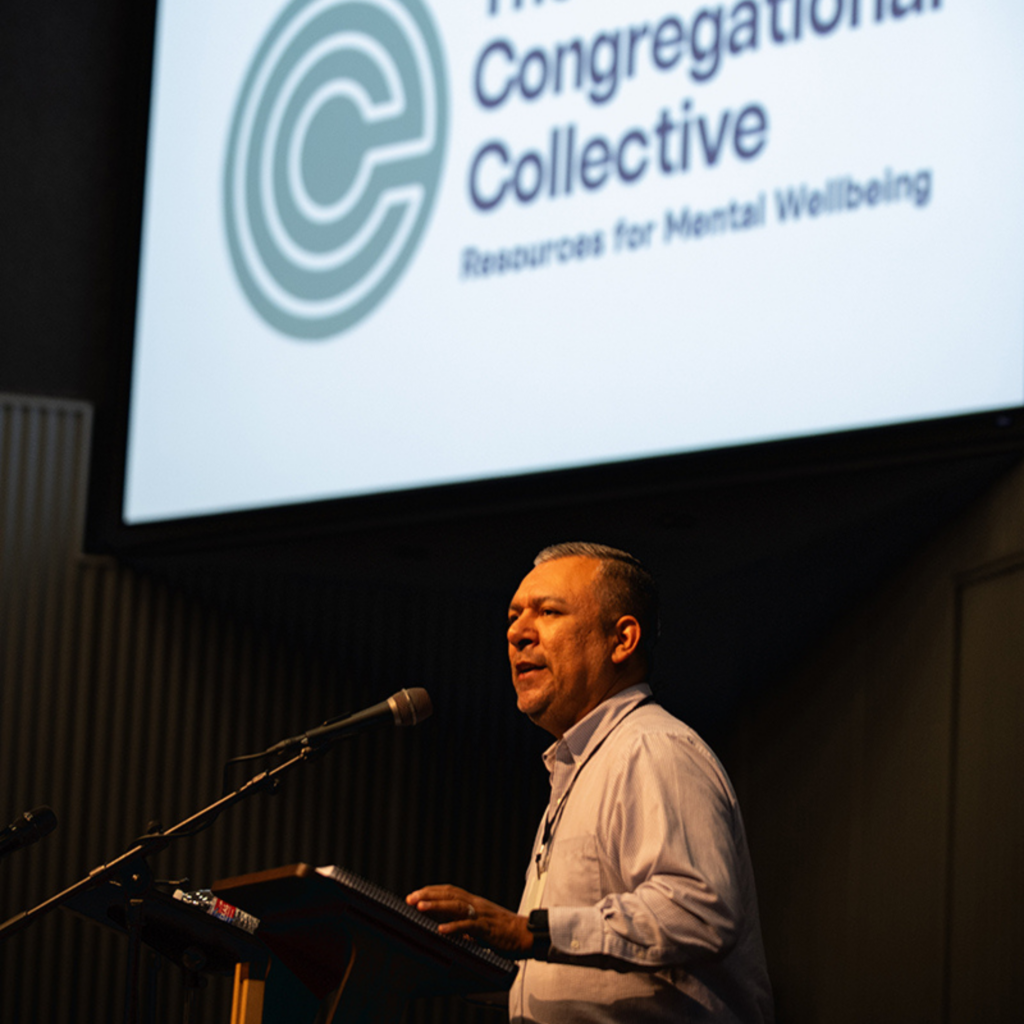Mental Health PlaybookThe Congregational Collective
- Geographic Focus: San Antonio, Texas.
- Mission: The Congregational Collective’s mission is to equip faith congregations to become community leaders in mental health and wellness by partnering to build support systems, networks and ministry tools that include educational resources, training and a network of relationships.
- Operating Budget: $1.9 million
- People Served: Youth, adults, families and vulnerable populations.
- Focus Areas and Core Competencies: Promote mental health and well–being within faith communities, provide evidence-based training and build collaborative partnerships between churches and community providers.


Impact Statement
The Congregational Collective is the nation’s first-of-its-kind program dedicated specifically to the intersection of spirituality and mental wellness. It goes beyond raising awareness and generating lasting change by equipping churches with tools and skills to support the mental health needs of their congregations.
A Conversation with Rebecca Brune, executive director of the Congregational Collective
Q: What is the mission of your organization? What specific areas related to mental health challenges are you working to solve?
Currently operating in eight churches across San Antonio, the Congregational Collective equips and builds the capacity of churches to identify early signs of depression and anxiety and effectively deliver proven mental health interventions, such as behavioral activation and peer support services. The aim is not to turn churches into clinics nor their congregants into clinicians, but to equip churches to be safe places and serve as trusted extenders of the mental health care delivery system.
The Collective was established in 2023 by the H. E. Butt Foundation as part of its ongoing 60-year tradition of integrating faith in every aspect of life. We are building on that dedication to mental wellness by embedding it within churches themselves.
Q: How do you describe the big goals your organization is working to achieve? How do you measure impact?
With so many people struggling with mental health needs, our faith communities are a natural refuge and trusted space. But churches often lack the tools to help guide and support people. The Congregational Collective is leaning into these trusted relationships to better support and equip faith leaders with the training and resources they need.
The Collective collects, analyzes and uses data to inform program design and measure impact. We have partnered with Harvard Medical School and University of Texas Medical School (UT Health) to develop a community-informed, mixed-methods approach. We use input from churches and communities they serve to drive program improvements, training methods, data collection, analysis and dissemination.
Q: What are some of the biggest challenges the organization has experienced in working to accomplish its mission? How did your organization overcome those challenges?
A recent survey conducted among our participating churches revealed that 74% of respondents have either personally experienced, or know someone who has faced, emotional or mental health challenges in the past year. Notably, 60% indicated a strong likelihood of turning first to their faith leaders for guidance when dealing with depression, anxiety or other mental health conditions. This aligns with a national survey showing that six-in-10 adults consider their faith or spirituality to be crucial in supporting their mental wellness.
These findings underscore the critical demand for our program and the work we do. Our primary challenge lies in expanding our capacity to effectively scale our program and training. By doing so, we aim to integrate early intervention services within churches and congregations, cultivate a network of supportive relationships and ultimately enhance and save lives.
Q: What are the organization’s biggest needs? How can philanthropists help your organization achieve its goals?
Church ministries have long been on the front lines supporting our most vulnerable populations. From foster care and food pantries to substance use recovery and homeless outreach programs, they work across the communities they serve. Knowing how to recognize and support people with mental health needs is another way to connect with and serve people who need help.
In 2025, The Collective will be tripling the number of churches we serve. We are looking to raise the support necessary to scale our model in Texas and create a playbook that can be used to inform the implementation and early adoption of this work in other communities across the nation.
The playbook would include a field-tested readiness assessment tool recognizing a church’s organizational and leadership capacity to engage in and sustain this work, adapted training curriculum, benchmark best practices and a catalog of well-vetted supplemental guides, podcasts and resource worksheets.
Q: Beyond the organization, where should philanthropists who care about advancing knowledge related to improving mental health invest their charitable dollars?
Philanthropy has an important role to play in improving access, delivery and the quality of mental health care in the community. Investments in improving mental health care – both preventive and treatment – specifically through faith communities, has the potential to influence large scale transformations that can improve lives.

Contact Our Team
Contact the Roundtable’s Programs team to learn more about this investment opportunity.
